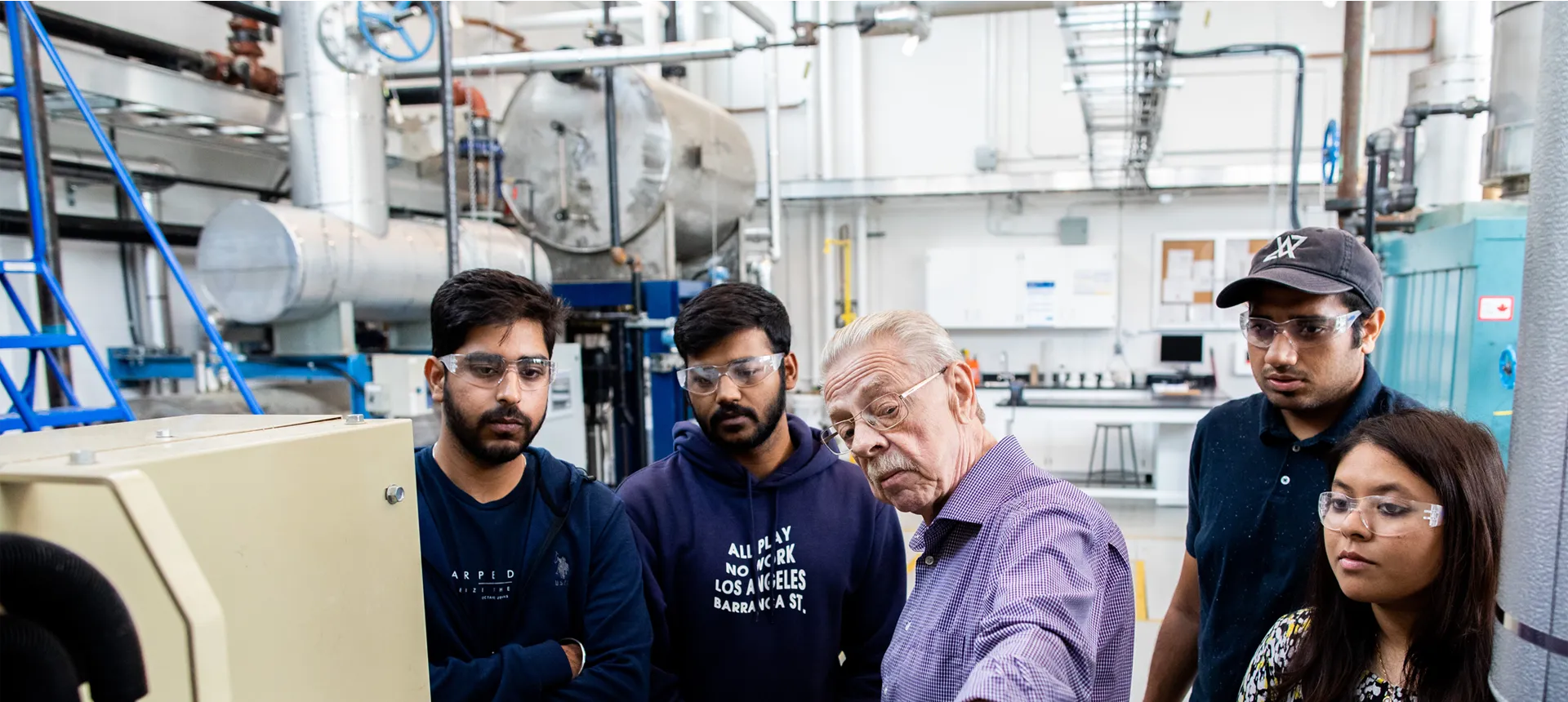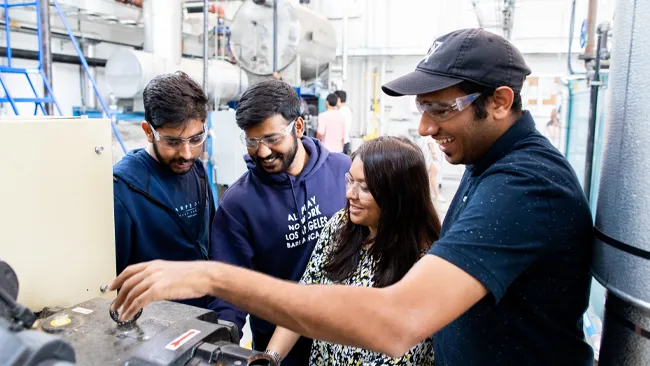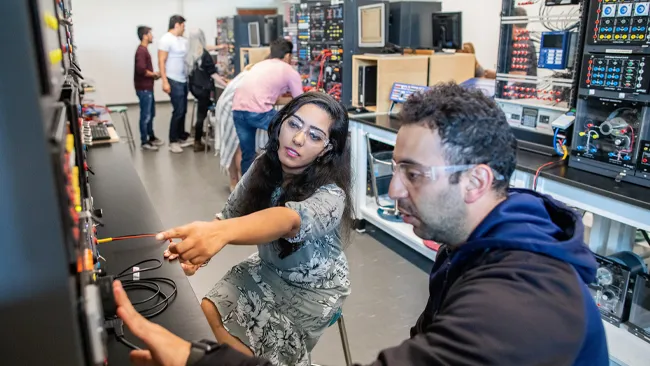Overview
A career as a Quality Engineering Manager involves overseeing and implementing quality control procedures, managing a team of engineers, and ensuring products and services meet or exceed customer expectations.
The Quality Engineering Management Ontario Graduate Certificate program provides individuals with the knowledge and techniques to improve the delivery and quality of goods and services. The focus of the program is the achievement of performance excellence in manufacturing and business processes through the use of modern quality improvement methods.
On completion of the program, the graduate will be able to contribute to the role of creating value in an organization and will be able to apply modern quality techniques and procedures to solve problems and enhance the quality of goods and services, to eliminate waste and improve value to the end customer.
The principles examined in this program are applied to a wide variety of industries. It includes skills training that recognizes the needs of the traditional manufacturing base, and also provides the proficiency demanded by many technology-focused industries.
Lambton College - A Great Place to Study
This Lambton College program is licensed to and delivered by Cestar College (PDF), a licensed private career college in Toronto, Ontario. Students who are registered at are students of a public college and as such, will receive full credit from Lambton College for all Lambton College courses completed at the Cestar College campus in Toronto. Students who meet program graduation requirements will graduate with a credential from Lambton College. Students may be scheduled to have classes on Saturdays.
Admission Requirements
- University degree in engineering or related field of study
The admissions process is competitive and meeting the minimum academic requirements does not guarantee admission.
Lambton College reserves the right to alter information including admission requirements and to cancel a program or course at any time; to change the program curriculum as necessary to meet current competencies or changes in the job market; to change the pathways to third-party certification bodies; or to withdraw an offer of admission both prior to and after its acceptance by an applicant or student because of insufficient applications or registrations or over-acceptance of offers of admission. In the event Lambton College exercises such a right, Lambton College's sole liability will be the return of monies paid by the applicant or student to Lambton College.English Language Requirements
- IELTS of 6.5
-or-
IELTS of 6.0 + Completion of EAP-3106 (English for Academic Purposes) during the first term of study
- or -
- TOEFL iBT 79
-or-
ITOEFL 70 + Completion of EAP-3106 (English for Academic Purposes) during the first term of study
- or -
- Passed Lambton Institute of English placement test
Please Note: IELTS is the only proficiency score accepted by the Study Direct Stream (SDS) program. Additional country-specific requirements may also be applicable.
Meeting the minimum English requirements does not guarantee admission. Students with higher English proficiency scores will receive priority in the admission assessment process. Not all students will qualify for EAP-3106 in place of the required IELTS or TOEFL test scores.
Costs
- Term 1 $9,340.00
- Term 2 $8,610.00
- Term 3 $9,310.00
- Term 4 $0.00
Total Cost of Program
Tuition fees are estimates and are subject to change each academic year. Fees do not include books (unless specifically noted), supplies or living costs.
Lambton College reserves the right to alter information including admission requirements and to cancel at any time a program or course; to change the location and/or term in which a program or course is offered; to change the program curriculum as necessary to meet current competencies or changes in the job market; to change the pathways third-party certification bodies; or to withdraw an offer of admission both prior to and after its acceptance by an applicant or student because of insufficient applications or registrations or over-acceptance of offers of admission. In the event Lambton College exercises such a right, Lambton College’s sole liability will be the return of monies paid by the applicant or student to Lambton College.
Additional Fees
WIL Project Fees
Students who are not successful in securing a co-op or fail to meet the co-op requirements will need to register in CPL-5559 WIL Project.
There is an additional fee of $2,480 for each student enrolled in the WIL Project course.
Textbooks
The anticipated cost for textbooks in this program is approximately $300 - $600 per term. This amount accounts for both mandatory textbook costs (included in tuition fees) as well as textbook fees not included in your tuition fee amount.
Important Dates, Deadline & Late Fees
For additional information on registration dates, deadlines and late fees please refer to Registration Dates and Deadlines.
Student Fees
A student services fee is included in your tuition.
Health Insurance Coverage
Emergency medical insurance is mandatory for all international students at Lambton College. This includes students who are full-time and part-time and who are on a co-op. This insurance is provided by guard.me - a third party insurance provider.
See Insurance Costs & Details
Technology Requirements
In order to keep pace with the requirements of each and every course in your program, Lambton College requires that each student have access to a laptop while studying at our college.
Labs & Equipment
Courses
Basic Statistics for Process Control
In this course students are introduced to data management and analysis, descriptive statistics, statistical probability concepts as well as inferential statistics. Students apply the knowledge of probability, random samples, and sampling distributions in solving discrete and continuous quality characteristics using the Minitab program. Process control limits and the process capabilities for key product/process characteristics are also examined. Students analyze the collected process data to determine existing and potential process quality issues.
Lean Production Systems
This course provides students with a practical understanding of Lean Production System as they develop continuous improvement skills. Opportunities to improve processes and systems including identification and elimination of waste, defining value, work measurement methods, and work analysis are provided. Topics including Value Stream Mapping, 5S, TPM and Visual Controls are also focused on.
Professional Communications
This course is designed for international students with diplomas or degrees. It focuses on polishing communications skills acquired through one's academic career and workplace experience. Through various business writing and speaking scenarios, students learn Canadian business practices and communication styles, incorporating inclusivity and diversity. Close attention is paid to proper incorporation of the intellectual property of others to ensure academic integrity. Students will practice organized and dynamic speaking and will strive for polished business documents.
Materials & Testing
This course introduces students to the basics of materials and testing techniques for metal, plastic, composite, and ceramics. Students conduct mechanical property testing on various material types and learn to interpret material properties such as strength, elongation, and hardness. Students also perform both destructive and non-destructive testing in the lab environment.
Canadian Workplace Health & Safety
In providing an overview of Canadian Labour laws, workplace rules and regulations, and Health and Safety Hazards in the workplace, students gain an understanding of the responsibilities of employers, worker's rights as well as the responsibilities of various organizations in the Canadian labour industry. Awareness and recognition of various health and safety risks arising from a variety of occupations is also covered.
Total Quality Management
This course reviews the history and guiding principles of Total Quality Management (TQM) leading to an understanding of critical success factors for implementing total Quality Management. Students are introduced to the pioneering quality philosophies of Crosby, Deming, Ishikawa and Juran. Areas covered include developing an organizational culture for quality, quality strategy, employee involvement, data analysis and effective communication for implementing TQM in manufacturing or service industries.
Advanced Statistics for Process Control
In this course, students are introduced to topics of advanced statistics as well as advanced statistical process control. By using more complex statistical techniques, such as ANOVA, students solve and interpret real-world problems. Students also calculate Linear and multiple regressions between variables. In addition to basics of Design of Experiment and various sampling techniques, advanced control charts for various process conditions are also utilized in this course.
Continuous Improvement Techniques
This course introduces students to the study of continuous improvement. Students practice basic continuous improvement techniques such as Kaizen, 5S, PDCA, error proofing, quality circles, and Six Sigma. Advanced Quality Assurance improvement techniques such as DOE, APQP, FMEA, and PPAP are also examined. Students identify waste as an improvement opportunity and develop improvement action plans.
Implementation of Integrated Management Systems
This course introduces students to the concept of Integrated Management Systems (IMS) which combine standards for quality, occupational health & safety, and environmental management. The integrated approach allows an organization to realize the benefits of multiple standards within a single simplified management system. Students learn implementation procedures and prepare example system manuals and procedures.
Economics of Quality
The Economics of Quality course introduces the cost of quality concept and illustrates how it drives continuous improvement activities which enhance companywide profit. Students become familiar with the various components of the cost of quality learning how to analyze and report the cost of quality. The course provides guidance on how to establish a cost of quality program and describe best practices for the deployment and utilization of the cost of quality concepts.
Geometric Dimensioning & Tolerance
In this course students learn to evaluate and use basic geometric dimensioning techniques and learn to read and understand blueprint drawings of mechanical devices based on the latest ASME Y 14.5 2009 standard.
Job Search & Success
This course provides student with skills and knowledge to help support their career search and succeed in the workplace. Students align their personal skill set and goals to guide them on their career paths. They will learn how to effectively conduct a job search, build a professional and well-tailored resume and cover letter, and develop and practice interview techniques. Students will also develop their personal brand to help support effective career networking and aid in their job search. Teamwork and collaboration in the workplace are also discussed. Self-reflection is used to inspire insight and support their professional career journey.
Quality System Auditing
This course introduces students to principles, practices and types of management system audits and equips them to demonstrate the valuable contribution that audit programs provide to organizations. Students gain an overview of the past and present state of auditing as well as an understanding of auditing trends.
Six Sigma Process Improvement Techniques
This course provides students an in-depth understanding of Six Sigma Improvement technique and clear sense of what is required to define high impact improvement projects for the enterprises. Students gain knowledge of how to establish Six Sigma measurements and complete Six Sigma projects using the systematic Define, Measure, Analyze, Improve and Control (DMAIC) methodology.
Metrology & Measurement System Analysis
This course introduces students to measurement tools and focuses on proper measurement techniques for these tools. Students apply this knowledge during hands on lab courses on the use of basic metrology tools, as well as operation of Computer Assisted Measurement Systems (CAM) such as Coordinate Measuring Machines and/or Coordinate Measuring Arms. Calibration principles and Measurement System Analysis (MSA) are also examined.
Reliability
This course intends to familiarize students with basic principles, applications, limitations and calculations of reliability. The course has an emphasis on understanding the value of reliability activities within the entire product lifecycle. Students will learn how to collect reliability data, how to set up reliability tests, analyze the test data and make reliability predictions. Also, probability modeling methods that use knowledge of system architecture and system component reliability will be studied to calculate system reliability.
Problem Solving & Decision Making Techniques
This course introduces students to structured problem solving techniques such as Eight Disciplines (8D) and the Six Sigma DMAIC process. Students work through real world case studies to apply basic and advanced tools to identify root cause and implement permanent and effective corrective actions.
Work Term (Full-Time)
Co-operative education provides students with the opportunity to apply classroom learning to the workplace, undertake career sampling and gain valuable work experience that may assist students in leveraging employment after graduation. For further information regarding co-op, please refer to: https://www.lambtoncollege.ca/co-ops-placements
WIL Project
Work Integrated Learning (WIL) Project is aimed at enriching students by connecting different program areas of study, cutting across subject-matter lines, and emphasizing unifying concepts. The focus of the WIL Project is to make connections between study and industry by engaging students in relevant and meaningful activities that are connected to and practiced within the professional workplace. WIL Project allows students to enhance and strengthen their employability prospects post-graduation by fine tuning skills and knowledge and meeting the expectations of today's employers. Students are required to attend the scheduled shifts in the WIL office, reporting to the WIL Supervisor. Weekly real-world challenges are presented in the WIL office, designed by industry professionals. In addition to the weekly assigned deliverables, students are also offered professional development sessions, and exposed to industry guest speakers, enhancing their opportunity to develop their professional network.
Co-op Eligibility & WIL Project Fee
In order to be eligible to secure an approved full-time co-op work term (CPL-1049), students must have a GPA of 2.8 or greater and complete all the co-op eligibility requirements. Failing to do so will require students to enroll in CPL-5559 WIL Project at an additional cost.
Contact
Centre for Global Engagement
LAMBTON COLLEGE SARNIA
226-313-7777
1457 London Road
Sarnia ON, N7S 6K4
After Graduation
Employment Opportunities

The nature of available job opportunities varies on previous work experience. Graduates of this program may find employment as: quality inspectors, quality engineers, quality coordinators, quality technicians, quality managers, ISO coordinators, quality supervisors, quality auditors and project managers.
Types of industries served include: automotive, aerospace, electronics, manufacturing, packaging, maintenance, construction and pharmaceuticals.
Co-op
About Co-op
Students in this program have the opportunity to gain valuable work experience by applying classroom learning during co-op experiences.
Learn more about co-op terms and the roles and responsibilities of students and co-op advisors.
More Information
Student Responsibilities
- Course and program delivery schedules are proposed and subject to change for each intake.
- Students are required to bring their own laptop with wireless capability.
- Students are advised to bring an official copy of their most recent police clearance, driver's license, and vaccination record from their home country.

Post-Graduate Employment
International students who successfully complete their programs of study at Lambton College may be eligible to apply for a Post-Graduation Work Permit (PGWP) Program. This program allows students to gain valuable Canadian work experience.
A work permit under the PGWP may be issued for the length of the study program, up to a maximum of three years. A post-graduation work permit cannot be valid for longer than the student's study program, and the study program must be a minimum of eight months in length. The length and approval of the PGWP is determined solely by Immigration, Refugees and Citizenship Canada (IRCC).
Students must meet the eligibility requirements to apply for a post-graduation work permit.
Immigration Regulations & Changes
Immigration regulations are legislated by the Federal Government of Canada and are subject to change at any time without notice. Students are responsible for ensuring that they are in compliance with all Immigration, Refugees and Citizenship Canada regulations at all times during their studies and while in Canada. Lambton College staff are not authorized to provide advice or guidance on immigration-related matters. Prospective applicants and current students should consult the Immigration, Refugees and Citizenship Canada website or call the IRCC Call Centre at 1-888-242-2100 to answer or clarify any immigration-related questions or information.
Technology Requirements
It is required that students purchase a laptop with a Windows operating system.
Internet Speed Requirements
For best performance for students learning remotely, an internet connection with a minimum of 40 Mbps download and 10 Mbps upload speed is recommended in order to effectively use video conferencing and remote lecture delivery software as well as, other online resources remotely. Due to the large area over which students may be dispersed, we are unable to recommend a specific provider, so you will need to inquire around your area to find one that best suits your needs.
Minimum Laptop Requirements
In order to access the internet and virtually-delivered software and courseware, student laptops should include the following at a minimum. By meeting the following specifications, students will be equipped to access software and courseware on their laptop through the internet:
- Intel i5 8th Gen Processor or equivalent
- 16 GB of RAM (with a minimum of 8 GB)
- 100 GB HDD or more
- HD Graphics
- Webcam with a microphone
- Wireless 802.11n/ac 5ghz capable
- Windows Operating System (Windows 11)
Software
To ensure students are getting the most our of their classroom experience, some software will be required.
Lambton College has made this software easily accessible online. Students can leverage our Microsoft Office 365 software packages and services. In addition, much of the software you require for your courses will be available on demand for use on any device - on or off campus.


